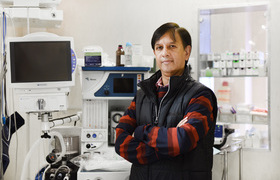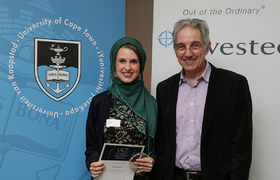Answering the call for ‘Futures Scholarship’
06 December 2018 | Story Supplied. Photo UNAMID,Flickr. Read time 4 min.
The University of Cape Town’s Surgical Society will launch a specialist incubator at the beginning of next year in a bid to tackle pressing health system challenges in South Africa, in line with Vice-Chancellor Professor Mamokgethi Phakeng’s “Futures Scholarship” programme.
Titled Futures in Health: Accelerator Project, the student-led incubator will be a university-wide engagement opportunity designed to draw together different divisions across UCT, including the Department of Surgery and the Bertha Centre for Social Innovation and Entrepreneurship, under the banner of global health.
Liam Devenish, head of the society’s new Public Health and Global Surgery portfolio, explained that the six-month incubator programme will equip student teams with the skills to identify and, thanks to the principles of health economics and entrepreneurship, solve “the problems facing our health systems and environment”.
This is their answer to Phakeng’s call at the end of August for the establishment of a “Futures Think Tank” to tackle the question of how UCT should change to meet the challenges of a rapidly-changing world.
She said at the time that the intention of her “Futures Scholarship” initiative is to consider what these rapid changes mean for “our future as a university, and as a society”.
Funding and pilot opportunities
Devenish said faculty members and industry representatives will supervise and mentor students throughout the programme, with the eventual goal being the development of funding and pilot opportunities for the student groups to trial and develop their “disruptive” ideas.
“It is a structured platform for student teams across the university to identify, deconstruct and understand systemic issues facing the South African healthcare system in any sphere, and gain the skills in social innovation and entrepreneurism, health economics, design thinking and agile entrepreneurship to plan solutions to these nuanced and persisting problems.”
“The project seeks to take the first step in making UCT, and indeed South Africa, an epicentre of innovation and advancement to solve the [intractable] problems facing our society.”
The idea was born out of a need to upskill students in the importance of active engagement with structural issues, and to help equip them with the conceptual framework of how to tackle these problems meaningfully, with a needs-based approach.
“The project seeks to take the first step in making UCT, and indeed South Africa, an epicentre of innovation and advancement to solve the [intractable] problems facing our society,” he added.
Their “soft start” to the project last month, to gauge interest and feedback, took the form of a pilot workshop called (Re)Defining Global Health. It was attended by 20 students who got the chance to engage with topics not included in their syllabuses.
“We found feedback to be overwhelmingly positive, with students leaving feeling empowered and encouraged by the multitude of simple solutions for big problems that could be devised in just one hour,” Devenish said.
For more information, visit the UCT Surgical Society website or go to the Facebook page where all their events are advertised.
 This work is licensed under a Creative Commons Attribution-NoDerivatives 4.0 International License.
This work is licensed under a Creative Commons Attribution-NoDerivatives 4.0 International License.
Please view the republishing articles page for more information.










